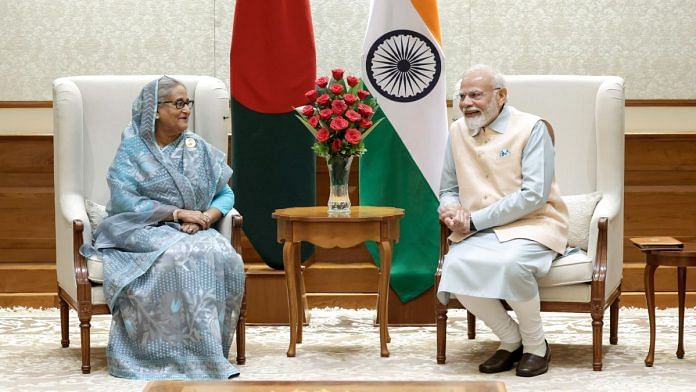The Bangladesh elections seem to be virtually a done deal, with Prime Minister Sheikh Hasina likely to be re-elected for a fourth straight term when the polls are held on 7 January – although this will be her fifth term as PM, having been elected once before in 1996.
The question, then, is not whether Hasina will be PM but what kind of PM she will be. What should Bangladesh, its neighbourhood and, indeed, the world, expect from her rule over the next five years?
The West vs Sheikh Hasina
At least the Western world is already positioning itself – mostly against her. The UK’s BBC has described the election as a “one-woman show,” the US’ Associated Press says she “threatens democracy,” while The New York Times, as far back as September 2023, headlined an article that said, “Quietly Crushing a Democracy, Millions on Trial in Bangladesh.”
On the other end of the spectrum lies Russia – as if to underline the fact that international diplomacy has been split wide open, at least since the Ukraine war – which has openly criticised the West for instigating an “Arab Spring” in Bangladesh. Meaning, according to Moscow, on the pretext of suing for democracy, Western nations are trying to unseat an elected government.
Some of the charges are startling. It seems that a diplomat in the US mission in Dhaka, Matthew Bay, met Jamaat-e-Islami leader Syed Abdullah Muhammad Taher on the US embassy premises, to discuss the political situation in Bangladesh just a couple of months before the polls.
You could argue that the Americans – or at least, the Democrat Party – seem particularly oblivious to the lessons of history. Back in 1971, the US sided with Pakistan against the creation of Bangladesh because Pakistan was giving the Americans access to the Chinese leadership, in the hope that Beijing would neutralise the powerful Soviets – and wilfully ignored the fact that the Jamaat had sided with the Pakistan Army and against its own people.
The Jamaat has, since, refused to cover itself with glory. It collaborated in the assassination of Bangabandhu Sheikh Mujibur Rahman in 1975, allied with General Ziaur Rahman’s Bangladesh Nationalist Party and has since openly colluded with organisations that openly target Hasina.
During the tenure of former PM Khaleda Zia from 2001-2006, an arms haul that filled about 10 trucks, allegedly meant to be infiltrated into India, was captured in Chittagong; it is said the arms came from Pakistan.
For some reason, the Americans seem stuck like a broken record on the Bangladesh question today. Democracy has become the leitmotif of Washington’s relationship with Dhaka, even though the word and all its connotations were never allowed to come in the way of the invasion of Iraq in 2003 and several other interventions across the world.
You would think that the Americans would know better, considering they are the oldest democracy in the world. For some reason, though, they are convinced that Hasina has been behaving like a tsar, a despot and an autocratic all rolled into one – a jumbo combo, which may even be true.
Also read:
India’s stance
The question, of course, that must be answered is: So what? And its follow-up: What is India’s view on the whole matter?
Let’s answer the follow-up first. It is significant that India is supporting Hasina power her way to the top. Prime Minister Narendra Modi is fully behind Hasina becoming PM again – the longest-serving woman prime minister in the world. It’s certainly not easy to stand up to the powerful US, but Modi seems to be doing it for Hasina.
Modi understands that Hasina is caught in a whirlpool trap, which is awfully difficult to get out of, especially when ambition, fame and recognition are staring you in the face; worse, there are no political challenges worth the name, because they have all withered away.
Second, the PM would certainly like to make amends for the past when some undiplomatic words were used by his closest confidant, Home Minister Amit Shah, on infiltrators into India – Shah had called them “deemak,” or termites.
Also read:
Hasina will pay a price
Certainly, Sheikh Hasina will pay a price for the support. She will owe Modi for the favour and when Delhi, for example, pushes through the rules for the 2019 Citizenship Amendment Act, as it intends to do very soon, Dhaka won’t be able to say much. The CAA provides Indian citizenship to persecuted minorities in Pakistan, Afghanistan and Bangladesh – except Bangladesh considers itself a secular nation and has strongly rejected the charge, as it did in 2019, that its Hindu and Buddhist citizens are persecuted.
Today, though, its lips might be sealed.
Certainly, too, there is something intrinsically similar in the leadership styles of both Modi and Hasina – both seem politically invincible, both have an undeniable hunger to rule and neither will brook a negative for an answer. Modi understands Hasina – it is unsurprising that he is her biggest supporter.
Of course, this too shall pass. By the time it does, Hasina will be PM of Bangladesh – again – and it is likely that Modi will win his own election later this summer. Both will watch from their vantage points how Biden fares in his own polls toward the end of the year. The next 12 months promise to be interesting.
Jyoti Malhotra is founder-editor of Awaaz South Asia web platform. She tweets @jomalhotra. Views are personal.



